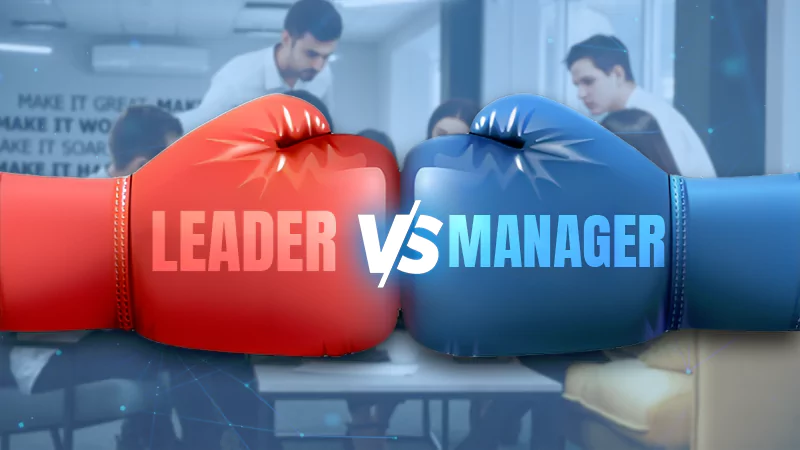
The leader vs manager debate is not new. It is as old as the start of industrialization.
However, modern knowledge and understanding are both needed for a business to achieve its goals.
Leaders help organizations develop a vision and a strategic direction. In contrast, the managers assist with the proper execution of that vision and perform micro-processes like business analysis and data analysis.
The blog below will try to delve deeper into the manager vs leader debate, and the reasons that both are essential for organizational success.
Definition of Leader and Manager
Before understanding the difference between a leader and a manager, it is important to understand the definitions of both terms.
The managers are responsible for executing the plans through optimum utilization of resources (manpower and others). Their primary focus is on fulfilling the basic organizational goals through people.
Leaders are responsible for developing the vision and inspiring workers towards a common goal. Their primary focus is on the transformation of both the organization and its people.
What Do Managers Do?
The managers are responsible for performing a wide variety of functions. Let’s have a look at them.
- The managers perform four key functions – planning, organizing, leading, and controlling.
- To perform the above functions they need to communicate, strategize, motivate, develop metrics, and provide guidance.
- Follow the organizational goals and objectives.
What Do Leaders Do?
As opposed to the managers, these types of bosses have different kinds of jobs to do.
- They understand the organization and its environment deeply, to push it towards a different vision.
- Their responsibility is to inspire the workers towards transformation.
- They challenge the status quo to form wider strategies for the company.
Further, let’s look at what makes both of them different from each other.
The Leader vs Manager Debate: 7 Key Differences
The leader vs. manager debate might be resolved by understanding the key differences between both types of bosses.
| Manager | Leader |
| Goal-oriented | Vision-oriented |
| Maintain status quo | Challenge status quo |
| Mimic their competitors | Try to be unique |
| Strategy-focused approach | Relationship-focused approach |
| Focus on the company’s goals | Focus on worker’s goals also |
| Management results are measurable | Their results are intangible |
| Work via command | Work via inspiring others |
| Controlling | Empowering |
| Repetitive | Innovative |
| Less tolerant of diversity | More tolerant of diversity |
Understanding such differences is important for two reasons. Firstly, managers can only achieve long-term success in their organization by adopting certain leadership traits. Secondly, they can only achieve success on the ground by adopting the practical intelligence and execution skills of their managers.
Personality
The personality of managers is generally rational and controlling. They are more persistent, hard-working, analytical, and autocratic. However, they may also be narrow-minded, with a focus on short-term goals.
Meanwhile, when it comes to the leaders‘ personalities, they are more insightful, partially drawn inward, and imaginative. They are open-minded, more tolerant, and empowering for others. At the same time, they are also visionary and futuristic.
Key Questions Asked
The managers always ask questions of ‘how’ and ‘when’ – directed towards the execution of the vision. For instance, a manager may ask how a business can achieve a certain position in the market.
While leaders focus more on the questions of ‘what’ and ‘why’ – directed toward the identification and development of a vision, for instance, they might ask what market position the business must achieve.
Goals
For a manager, the goals arise out of immediate necessity and environmental pressure.
The leaders take a more active and strategic approach towards the identification of goals. It helps the business to lead change instead of just responding to it.
Perception of Work
Managers perceive work as a more strategic process that combines people with goals and inputs to generate results.
For leaders, the work takes a more imaginative and emotional form, whereby they combine workers with dreams instead of mere ideas.
Relationship with Workers
Managers often seek to fit workers into their own idea of an ‘ideal worker’, with generally little scope for diversity or objection from them.
Leaders are generally more open to suggestions from workers and seek to work towards mutual expectations instead of only their own objectives. A leader knows how to nurture their employees into a better team, they can suggest some fun skills to learn, make them do team building exercises and other stuff as well.
Position
Managers can not work like managers without having a designated position in the organization.
While the leaders do not need a designated position to inspire others to achieve their best selves.
Key Functions
Managers closely examine the daily organizational processes, immediate goals, and associated roles.
Leaders are more concerned with the larger picture – the long-term position of the business, futuristic values, and probability of growth.
Hence, to answer the question, “What is the difference between a leader and a manager?”, it simply lies in their style of combining people with business goals.
The Traits: Manager vs Leader
It is indeed true that there’s a certain role of continuous learning in professional development. However, certain fundamental traits in one’s personality play a crucial part in taking the role of a leader or manager.

So, to draw the manager vs leader comparison, let us look at the individual traits of both of them.
Leader Traits
Several traits are unique to the functioning of an efficient leader. Let’s have a glance at them:
- Empathy: Such bosses can quickly understand the feelings and thought processes of others, thereby developing a strong bond with them.
- Communication skills: They can efficiently convey their thoughts, expectations, and feelings to team members.
- Values: The reason they can inspire others is because of their integrity with their values and beliefs.
- Courageous: It is their courageousness that helps them to challenge the status quo and be highly innovative.
- Open-minded: They are open-minded towards new ideas and tolerant towards diversity.
- Passionate: These types of bosses are known for their strong focus on their vision and ideas, with a prayer-like dedication to them.
- Creativity: People in such roles do not necessarily follow trends or competitors. Rather, they can think outside the box and devise unique solutions.
Therefore, highly efficient leaders possess all of the above traits in the list that help them excel in their field.
Manager Traits
Further, for an efficient manager, there are certain traits that define their personality. Follow below to find these traits.
- Control: The managers must be good at controlling the resources of production – manpower, finance, and raw materials.
- Dependable: Both the workers and top managers must be able to trust the managers to carry out their duties for optimum resource utilization.
- Interpersonal skills: When it comes to interpersonal vs intrapersonal intelligence, managers need to have more interpersonal skills than intrapersonal ones. It helps them to effectively integrate the needs of top managers with that of workers.
- Process management: Managers must be capable of carrying out the needed processes in the organization to achieve business goals.
- Balanced approach: Good managers are always capable of balancing the expectations of all stakeholders of the business.
- Problem solvers: The greater responsibility of managers is to respond to the environment instead of leading the change. They must be able to identify and solve problems effectively.
- Analytical: It is analytical intelligence that helps managers understand and solve problems and control the resources of production.
Hence, the trait characteristics of leaders vs managers can help to understand the key differences in their personalities and ways of functioning.
Similarities Between Leadership and Management
The knowledge of the difference between leader and manager must be followed by insight into their similarities.

That being said, let’s take a look at some of the key similarities between the managers and the leaders.
- Tracking the environment: Both managers and leaders consistently track the micro and macro business environment factors to help with the business goals.
- Strategy development: They both need to develop strategies for their specific vision and goals.
- Effective communication: These bosses need to be efficient at communication to carry out their roles.
- Accountability: Both leaders and managers should be accountable for their actions and possess certain levels of integrity.
- Decision-making: Their decision-making skills should be both efficient and impactful to generate good results.
Thus, even after much emphasis on the managers vs leaders debate, they are similar in the key responsibility areas related to people and organization.
Measuring Effective Leadership and Management
There are ways to measure whether a leader or manager is effective in his/her job.

That being said, let’s take a look at some ways to measure managerial effectiveness.
- Quantity of output
- Quality of results
- Minimization of wastage
- Adhering to deadlines
- Brand awareness
- Brand perception among the audience
Further, there are ways to measure the leadership effectiveness of a person.
- Employee engagement
- Work culture
- Development of vision and values
- Employee satisfaction
- Team motivation level
Hence, the difference between manager and leader could easily be understood with the difference in the criteria for their effectiveness.
How to Develop Management and Leadership Skills?
The individuals may work to improve management and leadership skills within themselves. These skills can help one succeed in a diverse number of fields. Below are some of the measures for it.
How to Develop Management Skills?
There are several ways one may develop management skills.
- Pursuing formal training programs and courses for management can help to build such skills.
- For students, participation in internship projects or volunteer work could help to build management abilities.
- The bosses could ask for feedback from their subordinates to increase their management knowledge.
- Consistently refining one’s knowledge regarding the new ways of practicing management. Such preparedness can change one’s life significantly.
How to Develop Leadership Skills?
Further, one may also develop leadership skills through a variety of measures.
- Leadership development programs can significantly help one to build such abilities.
- The development of self-awareness is also particularly helpful in building such skills.
- Self-assessing oneself through self-assessment tests and feedback measures helps to identify areas of improvement.
Therefore, leadership and management skills could be efficiently developed in a person via any of the above methods.
When to Manage and When to Lead?
Neither leadership nor management is the only solution to organizational situations in a business. Both are needed across different scenarios.

Below are scenarios whereby management practices are essential within the organization, due to the need for strong control and authority in those times.
- During the execution of a strategy.
- At a time of crisis.
- While training new recruits or old employees on new practices.
- At the time of new projects.
- During close deadlines.
- When low creativity and more specific results are required.
Further, in the following scenarios, leadership is needed in the organization, to inspire workers and lead a transformation.
- At a time when a transformative change is needed.
- With highly skilled and responsible employees.
- When high creativity and initiative are required from the workers.
- During motivational team meetings.
- At the time for one-on-one sessions with workers.
Therefore, to answer the question, “What is the difference between a manager and a leader” – it also depends on the particular scenario within the organization.
To Sum it Up
True, when it comes to the difference between management and leadership, there are a large number of them. However, both of these fields also merge in many aspects.

For an organization, both of them are necessary across different scenarios for the highest possible efficiency.
FAQs
Ans: Generally, leaders are good managers. But managers are not necessarily good leaders.
Ans:
Weak leaders are those who create an intimidating atmosphere, take credit for success, and blame others for failures.
Ans: Leaders can inspire others to work on their strengths. Followers generally lack initiative and self-drive to lead.
Ans: In truth, no one is better than the other. Both leaders and managers drive organizational success.